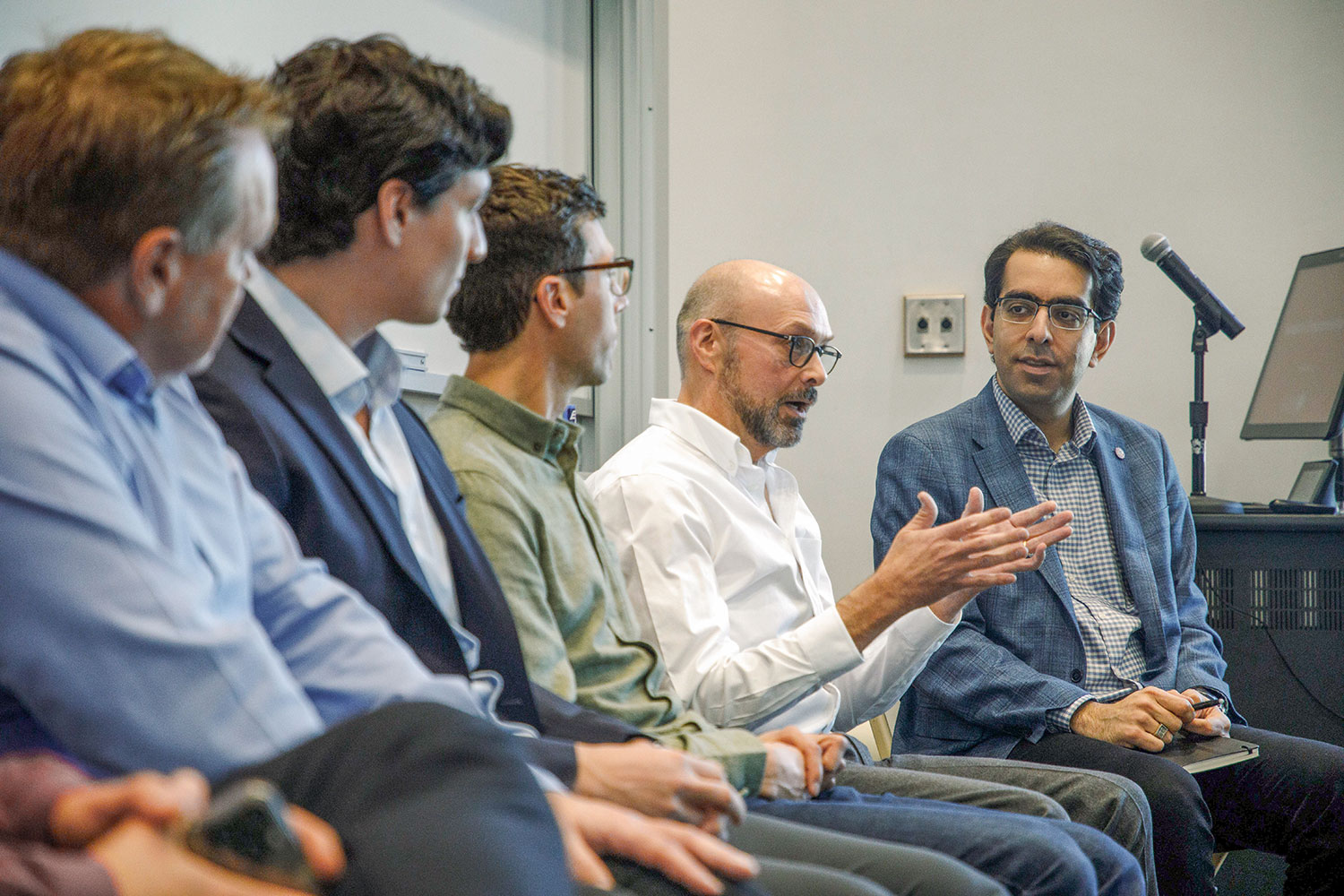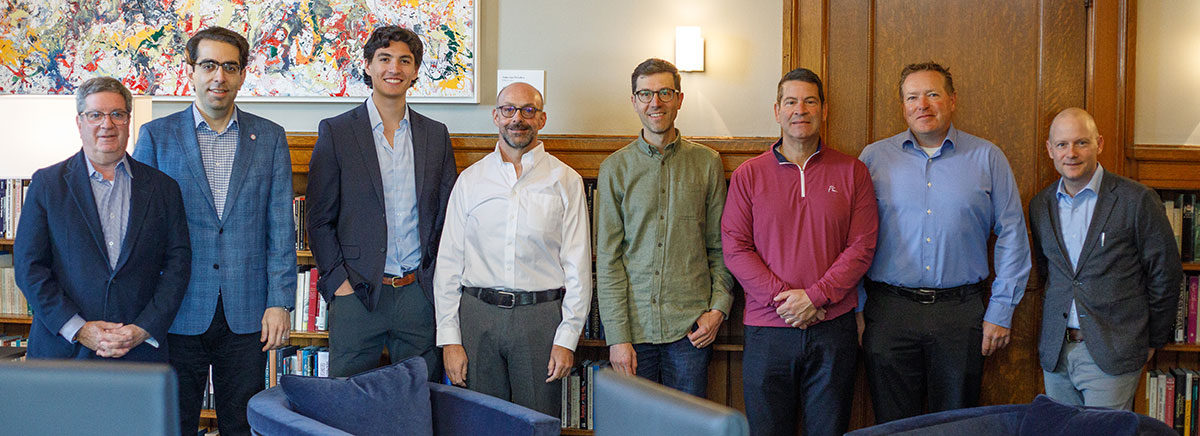Geospatial entrepreneurs offer tips for successful startups

Clark University’s Center for Geospatial Analytics recently brought students face to face with five leaders in the geospatial industry who shared tips on launching, funding, and working at startup companies.
“A degree in GIS from Clark opens all kinds of career opportunities,” said Hamed Alemohammad, director of the University’s Center for Geospatial Analytics and associate professor of geography. “Many of our students are hired right out of school to work for geospatial technology companies but may not realize they also have the skills to start their own companies. We wanted them to meet some of the most successful entrepreneurs and investors in the fields of geospatial analytics and location intelligence to learn how they might do that.”
Part of Clark’s annual Practicing Geography and GIS Week, the Nov. 16 event featured a panel of experts: Andrew Schiller, Ph.D. ’01, founder of Location Inc. and inventor of neighborhoodscout.com, a relocation tool that serves 250 million users; Steve Schroeder, co-founder of CoreLogic, which acquired Location Inc. in 2020 and has expanded to develop risk-management tools for insurance companies and realtors; Jonathan Glick, principal data scientist for CoreLogic; Tim Curran, CEO of Building Engines, a software company that develops property management tools; and Andrew Berg, a venture capitalist for Companyon Ventures.
Before the panel, they met with David Chearo, vice president for planning and chief of staff to President David Fithian, and Jonathan Kappel ’81, executive director of principal gifts.
Below are a few of the takeaways the panelists offered students.
Start with a problem that needs to be solved.
“Follow your passion. If there’s a big problem out there, and you wake up thinking about it, there’s probably a path for you to do that,” Schiller said “The best would be a big problem shared by a lot of people. Are customers willing to pay for this to solve their problem, and who are those customers?”
Schiller began creating the algorithm for his startup when he was a Clark doctoral student. He launched Location Inc. — which included a relocation tool for home buyers — by identifying “a problem faced by many: How do I choose the right place to live now, at this time in my life, in any area of the U.S.? Millions of people move every year with imperfect knowledge.”
Find one customer, solve their problem, and build on that success.
“The more valuable the problem-solve is, the more valuable the business is going to be. Even if you do it as your class project, or you do it pro bono, solve that problem for somebody. And then they can say, ‘Wow, this saved us a lot of money.’ ” Schroeder said. “It only takes that one customer success to then be able to go out to those other customers and say, ‘I can do this for you, too.’”
Schroeder co-founded CoreLogic and was the CEO for 10 years, during which he oversaw development of a mortgage lender data consortium that applied property risk analytics to process 70 percent of all mortgages in the United States.
Another route is operating as a value-added reseller (VAR), where you earn money by contributing additional services or features to a company’s existing product.
“You can get started really with not much money at all by saying, ‘I’ll come in and do this for you, and you pay me by the hour,’ until you can productize it,” he added.
Hire the best people and find role models.
“If you have great people associated with your business, great things are going to happen,” Curran said. “They need to be capable from the top down — if your leaders aren’t capable, your whole company is going to be a mess.”
Curran has led five startups as CEO, and insisted he has one key measure when recruiting and interviewing candidates: “No a**holes.”
When Curran is looking to develop his skills, he looks for role models, identifying the person who is the best at a particular job. “I think people believe that if I go out and get help, it’s a weakness,” he said. “It’s not a weakness — it’s actually a sign of strength.
Expand your skills, become a generalist, and listen and respond to customers.
“Even if you’re not a founder, being part of a startup is always more than a job. And every person in a startup is crucial to the success,” said Glick, who doesn’t describe himself as an entrepreneur but as a geographer who found himself enjoying working for a startup. “In a startup, I’ve found that you’re much less likely to remain a specialist in the same domains you were trained in” and that “in a lot of situations, you’ll be outside your comfort zone.”
At Location Inc., Glick learned to listen and respond to customers, including insurance companies that wanted more information about property and neighborhood risks. He helped develop a tool to predict non-weather water-related insurance claims, such as bathtub overflows — a risk not always easy to uncover but possibly more common in high-income neighborhoods.
Find your superpower, make a plan, widen your network, and ask for funding.
“Think about your future. Think about what you’re good at. Think about your strengths, your weaknesses, what you want to work on, and then from there, build a plan,” Berg said.
The venture capitalist (VC) also offered a simple tip on identifying potential funders: In LinkedIn, type in “Investor at ventures,” find those investing in your startup area, and reach out.
“Reach out to as many of them as you can, ask them for a meeting, and then, if it’s not a perfect fit, always ask them, ‘Is there anyone in your network, any other firms that you work with, or know, that would be a better fit for my startup?’” he said. “It can take anywhere from two to six months for a VC to really get conviction and send you money.”
But, Berg added, “if you can get some VCs excited about it, everyone’s going to follow suit. You’re not going to have to reach out on your own. People will hear about you and start reaching out to you.”



